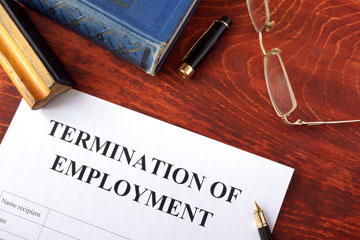Workers’ compensation claims are complex and can be decided only on the basis of a comprehensive medical records review and other formalities. In fact, medical record review for attorneys handling workers’ compensation claims relies on such reviews to determine whether an injury is work-related. Employers usually have a challenging time handling workers’ comp claims, and a major challenge arises when they consider terminating an employee who has filed a workers’ comp claim. If the termination is unfair, most states’ workers’ comp laws impose penalties such as fines, jail time or both. Employers may not terminate someone “because” or in some states “solely because” the employee filed a claim. Terminating an employee who has filed such a claim is not totally prohibited, but employers have to be very cautious to avoid a situation where it could be inferred that the employee was fired because of a workers’ compensation claim.
Why do employers consider terminating their employees? Employers usually consider terminating an employee when he/she exhibits poor work performance, engages in misconduct or fails to return to work after a work injury. When an injured worker does not return to work for lengthy periods of time, it can be very distressing for a small business owner. Often, injured workers do not return to their pre-injury job because they fear they may get injured again or it is too physically demanding. Employers also may not be able to offer suitable jobs to their recovering employees, especially if they feel that taking that person back to work could create a liability. Moreover, the employer will have to fill the vacancy caused by the injured worker by recruiting someone who can physically perform the required tasks. Thus both the employer and the employee have reasons to not continue the employment.
In most workers’ compensation cases, the employer will remain liable to provide compensation to the injured employee as long as he/she remains unemployed on account of the injury. Without a job to return to, injured employees may not be keen to return to work unless they find a job with similar pay to their pre-injury job. If the pay is less, the employer at-the-time-of injury will be liable to pay partial disability benefits, i.e. two-thirds of the difference between the worker’s new wage and her pre-injury wages. The best thing for the employer to do is not to fire an injured worker without giving that person sufficient time to recover and try to return to work.
Suppose the employer has to fire an employee who may have filed a workers’ comp claim. What are the steps employers can take to reduce issues related to wrongful termination?
- Carefully read your state statute: Employers must take care to clearly understand workers’ compensation statutes of their state that apply to them. Most state laws cover employers who have very few employees, even one employee.
- Consider all the facts, timeline and circumstances: It shouldn’t appear that you fired the worker because she filed a workers’ comp claim. Take the case of a worker who you are considering to terminate for misconduct that occurred 5 weeks ago, but who sustained a work-related injury and filed a claim 4 weeks later. If you documented the misbehaviour, conducted an investigation, interviewed witnesses, considered fitting discipline, consulted the management and then decided to terminate the employee a few weeks later after the employee filed the claim, you will have a reasonable explanation that the timing of the termination decision was caused by the time required for the investigation and was not related to the employee’s filing of the claim.
- Examine discipline you may have imposed for similar misconduct: No employer is likely to fire an employee just because she was hurt at work and filed a workers’ comp claim. Suppose an employee engaged in misconduct or exhibited poor performance and the discipline you imposed was to issue a warning or maybe you demoted the employee. Suppose you fired another employee who has a pending workers’ comp claim for the same behavior. In such an instance, the fired employee could question your reason for firing, especially if the discipline imposed on her for similar conduct was more severe than for the other employee.
- Review your employee handbook and personnel policies: Employers should have a clear idea about their policies regarding progressive discipline and termination. Consider whether you require verbal counselling, written notice or both before firing an employee. Failure to follow your policies can lead to trouble.
Employers must therefore ensure that they have properly evaluated all possible issues and risks when considering terminating an employee. They should be aware that terminating an employee could create a lawsuit. Experienced legal counsel would be the best recourse in such instances.




